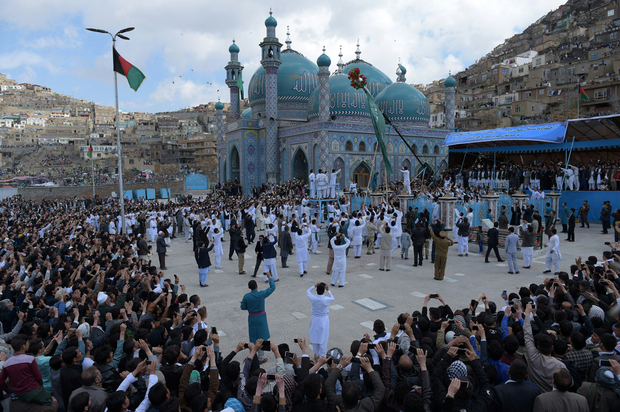May 13, 2016

A perusal of the Western media will quickly tell you that Russia and Iran are getting very close and have for all practical purposes formed an alliance to confront the West in general and the United States in particular.
But many analysts—perhaps most analysts—who watch these things warn against such simple conclusions. The Islamic Republic may indeed be eager for such an alliance, which would give it an enhanced position sitting at the right hand of a major world power.
But the bottom line is that the two countries really don’t have many shared interests. Most importantly, both are heavily dependent on oil and gas and are rivals for markets, which is not exactly a foundation for close ties.
They currently have converging interests in Syria, which is what has given many people the impression of a burgeoning alliance. But their interests do not come together in many other areas.
Even their bilateral trade is falling, as neither Russians nor Iranians seems to think much of the other’s products.
On nuclear issues, Russia doesn’t want Iran—or any other country—to get the bomb. The sole foreign policy issue on which the old Soviet Union worked closely with the United States was stopping other countries from getting nuclear weapons, which can only diminish the Soviet/Russian role in the world.
Iran says it wants no bombs, and only plans to develop a nuclear industry, exporting nuclear products to the rest of the world. But that doesn’t endear it to Russia either, because that is challenge to one of Russia’s main export industries.
The up-and-down, on-again, off-again sale to Iran of the S-300 air defense missile system is an indicator of a tense and untrusting relationship. Russians have said they won’t deliver the entire system to Iran until Iran drops its contract lawsuit against Russia, and Iran has said it won’t drop the suit until Russia delivers the missile system.
The Russians are not even pretending to a close alliance with Tehran. “We are continuously developing friendly relations with Iran, but we cannot really talk about a new paradigm in our relations,” Kremlin spokesman Dmitry Peskov said in March.
“There is a military-economic aspect to this alliance, which is beneficial to both sides,” Maziar Behrooz, associate professor of Mideast and Islamic history at San Francisco State University, told Reuters.
“But on a geopolitical level, Iran and Russia can only form a tactical short-term alliance, not a strategic one. I think the ideological differences between the two are just too deep.”
The relationship appeared to reach a new level last September when Russian President Vladimir Putin ordered a military intervention in Syria in line with Iran. Astoundingly, the Islamic Republic even allowed Russia to fire cruise missiles through Iranian airspace to Syria targets.
Militarily, the two powers proved complementary. Iran brought disciplined ground troops who worked well with their local allies, while Russia provided the first-rate air power that Iran and Syria lack.
But Russia has little incentive to join the Shiite “Axis of Resistance” to Western interests in the region, which is championed by the more conservative Iranian faction, because this could ruin its relationships with other Middle Eastern powers such as Israel, Saudi Arabia and Egypt.
Russia’s first big intervention in the Middle East since the Cold War followed months of secret meetings in Moscow between Putin and Iranian officials, including Qassem Soleymani, the Qods Force commander, and Ali-Akbar Velayati, foreign policy advisor to Supreme Leader Ali Khamenehi.
A close and exclusive alliance with Russia would suit Khamenehi, who has blamed Western influence for Iran’s troubles and pushed hard to implement his “Look East” policy.
But it runs contrary to the views of President Rohani and Foreign Minister Mohammad-Javad Zarif and many others in the establishment, who feel Russia—whether under Putin, commissars or czars—has always screwed Iran.
“Russians have always used us as a tool in their foreign policy. They never stayed committed to their alliance with any country,” Abdullah Ramezanzadeh, who served as spokesman for former President Mohammad Khatami, told Reuters.
Putin has, however, worked hard to improve relations with Iran. During his November visit to Tehran, he presented Khamenehi with one of the oldest copies of the Qoran, which Czarist Russia had seized during its invasions of northern Persian in the 19th Century.
When it comes to winning lucrative business contracts now that nuclear-related sanctions have been lifted, the indicators so far are not good. There is little sign of Russian companies making new inroads into Iran. There have been numerous announcements of massive deals in preparation, but nothing has come of any of them—not even deals to sell Russia Iranian vegetables, chicken and shrimp.
Some suspect these deals are being sabotaged by the many establishment figures in Iran who roll their eyes at getting closer to Russia, concluding there is little to be gained economically and a lot to be lost politically by sidling up to a regime that both Europe and America want to throttle.
Two Israeli researchers have said the idea of a Russian-Iranian alliance makes sense to many for four main reasons. First, Russia and Iran have a shared interest in disrupting a US-dominated order in the Middle East. Second, the Russians were seen as leaning toward Iran during the nuclear negotiations because they supported Tehran’s nuclear program, by building reactors in Iran and pushing for more favorable terms for sanctions relief during Iran’s negotiations. Third, Iranian and Russian interests in Syria have converged into a coordinated military campaign to prop up the regime of Bashar al-Assad. Fourth, Russia hopes to exploit newfound economic opportunities in Iran now that sanctions have been lifted.
But those researchers—Ari Heistein and Vera Michlin-Shapir, who both work at the Institute for National Security Studies in Tel Aviv—argue that a closer look at these supposed convergences of interest indicates they are plagued with limitations and differences.
For example, they note that Russia’s interest in counterbalancing the United States aims to achieve parity with America, or at least US recognition of Russian interests. If this is achieved, then the tactic of waving friendship with Iran in front of Washington will have served its purpose. Iran is a mere tool, they say.
When it comes to Syria, Russia and Iran “have radically different designs for Syria. Russia is interested in preventing the fall of the Alawite-led Assad regime and preserving a client state in the region. Iran is interested in Syria becoming completely reliant upon and under the influence of Tehran,” not Russia.
Heistein and Michlin-Shapir say the Iranians are diffusing the authority of the Syrian state by training, indoctrinating and arming more than 100,000 local militiamen in the decentralized National Defense Forces. “In doing this, Iran hopes to build up local grassroots client militias whose allegiance is first and foremost to their principal in Tehran, rather than the Syrian government,” they write.
Furthermore, Russia cooperated with the West in restricting Iran’s nuclear program in the Big Six talks with Iran. A former senior Obama Administration official, Philip Gordon, said recently that once Russia learned of the secret Iranian nuclear site at Fordo in 2009, Moscow became a cooperative partner with the United States. Gordon attributed the Russian cooperation to Moscow’s being unnerved by the imminent possibility of a nuclear Iran.
Heistein and Michlin-Shapir say that once Russia was included in the negotiation process “and could play the role of a political arbiter considered equal to world powers such as the United States, China and the EU, Russia played cooperatively to prevent Iran from acquiring nuclear weapons, at the expense of its relations with Iran.”
























